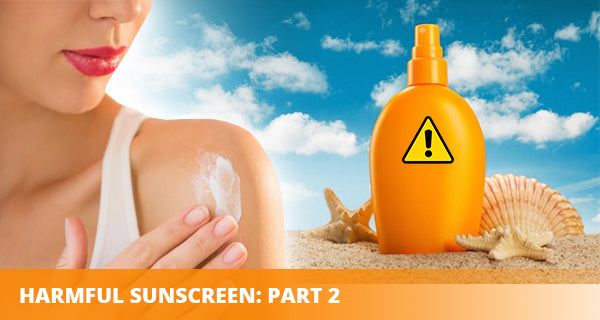In part 1 of this series, we discussed how most sunscreens are full of potentially hazardous chemicals. Not only is it a fat that these products offer an incomplete protection against sun damage, they even contribute to skin cancer, which ironically is the main reason why you are applying sunscreens in the very first place.
To sum up, let’s look at this excerpt from the executive summary of Environmental Working Group’s 11th Annual Sunscreen Guide: “There is little scientific evidence to suggest that sunscreen alone reduces cancer risk, particularly for melanoma, the deadliest type of skin cancer. Despite a growing awareness of the dangers of exposure to the sun’s ultraviolet radiation, and a multi-billion-dollar sunscreen industry, melanoma rates have tripled over the past three decades.” [1]
In part 2, let’s look at some more adverse effects associated with using chemical laden sunscreens.
Vitamin D deficiency
Your body naturally makes significant amounts of vitamin D when the skin is exposed to sunlight. Clearly, most sunscreens block this process, making you deficient in vitamin D, a steroid hormone that helps you build strong bones, regulates your immune system and cuts down your risk of developing many types of cancer.
Vitamin D deficiency is associated with an increased risk of developing osteoporosis, cancer, auto-immune disease, heart disease, depression and pregnancy complications. Sensible sun exposure, where you don’t get to the point of becoming sunburnt, is the best way to increase your vitamin D levels and prevent disease. However, if your skin burns easily or you are at a risk of developing skin cancer, taking vitamin D supplements is a much safer option.
Higher SPF offers a false sense of security
Wearing sunscreen doesn’t mean you are fully protected against sun damage. This means you simply can’t rely solely on sun blocking products as your only preventive measure. Secondly, using products with higher SPF doesn’t mean better protection. In fact, it may lull you into a false sense of security.
You may end up spending more time out in the sun while ignoring other safe sun practices (like rea-applying sunscreen at regular intervals, staying covered and always wearing a hat), in the belief that you are adequately protected when in reality you aren’t. This increases your risk of sunburn and skin cancer.
Poses threat to aquatic environment
A 2016 research from King's College, London found high levels of oxybenzone at some of the world’s most popular coral reefs. The team found that the chemical damages coral in many ways. It causes bleaching and interferes with reproduction and growth, causing deformities in young corals. Additionally, it works as a skeletal endocrine disruptor and induces ossification, causing coral larvae to encase itself in its own skeleton and die. [2]
Should you ditch your sunscreen?
Yes, but only the wrong ones. Remember, sunscreens do protect against sunburn, known to increase your risk of developing melanoma. However, these UV absorbing products shouldn’t be central to your overall sun-protection strategy. So, what should you do?
Choose your product wisely and use it appropriately as well. You need to re-apply sunscreen every 2 hours and more often if you are swimming or sweating profusely. Instead of using a chemical laden product, opt for mineral sunscreens that contain zinc oxide or titanium dioxide. Just make sure the product does not contain nano-sized particles. EWG has published a comprehensive list of the best sunscreens here to help you make an informed decision. And then you also have other options to prevent sunburn and other types of sun damage.
Safer way to avoid over-exposure to sun?
- Stay in the shade when possible
- Cover up as much as possible; use an umbrella, wide-brimmed hat, long-sleeved clothes and good quality sunglasses to shield your skin and eyes from UV damage.
- Keep your skin healthy inside out. Eating a lot of fresh fruits, vegetables and omega 3 fatty acids (from fish or supplements) provides your skin all the vitamins, proteins and anti-oxidants it needs to naturally fight free radicals and protect itself against sun damage.
References:
- EWG’s 11th Annual Sunscreen Guide. Environmental Working Group.
- Down et al. Toxicopathological Effects of the Sunscreen UV Filter, Oxybenzone (Benzophenone-3), on Coral Planulae and Cultured Primary Cells and Its Environmental Contamination in Hawaii and the U.S. Virgin Islands. Environmental Contamination and Toxicology. 2016.
Disclaimer
Information on our websites, in our blogs and our emails are provided for informational purposes only, and have not been evaluated by the EMA, EFSA or FDA. It is not meant to substitute medical advice provided by your healthcare professional and is not intended to diagnose, treat, cure, or prevent any disease. Our products are intended for adults, 18 years of age and older. While the vitamins and supplements mentioned here have been shown to have various health benefits, it is important to remember that supplements and dietary changes should be considered as part of an overall health plan and not as a substitute for professional medical treatment. Only a qualified healthcare practitioner can provide personalized advice and treatment plans based on your individual health needs and medical history, and you should seek advice from your healthcare professional before taking product(s) if you are pregnant or nursing.

